Heroines and Society: Breaking Stereotypes and Challenging Norms
VerifiedAdded on 2023/06/10
|10
|2909
|489
AI Summary
This article explores the lives of powerful women who challenged societal norms and broke stereotypes. It discusses the heroic deeds and sacrifices of women like Joan of Arc, Cleopatra, Iphigenia, and Laskarina Bouboulina. The article also highlights the patriarchal setting of society and how women who dared to be different were viewed critically.
Contribute Materials
Your contribution can guide someone’s learning journey. Share your
documents today.
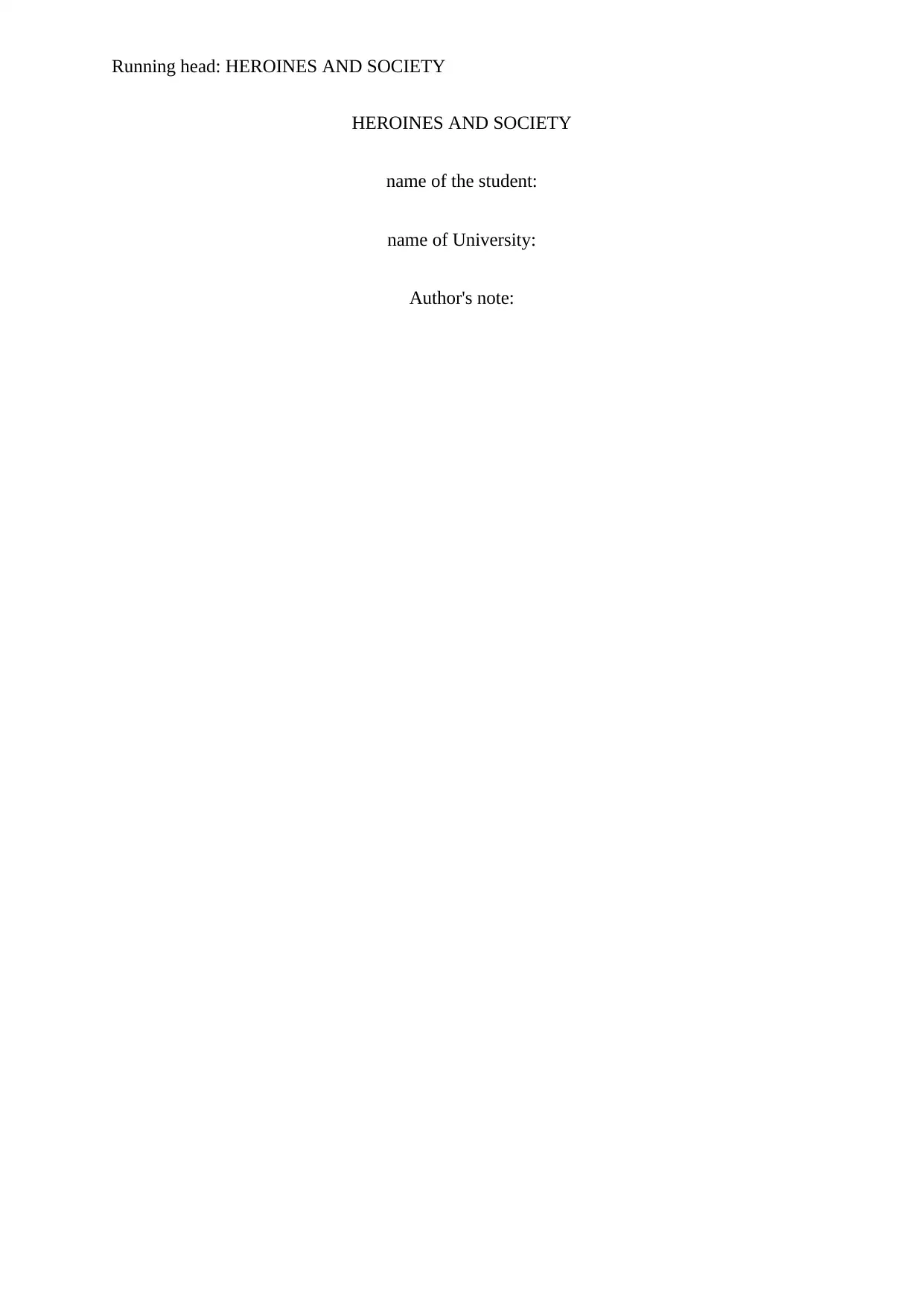
Running head: HEROINES AND SOCIETY
HEROINES AND SOCIETY
name of the student:
name of University:
Author's note:
HEROINES AND SOCIETY
name of the student:
name of University:
Author's note:
Secure Best Marks with AI Grader
Need help grading? Try our AI Grader for instant feedback on your assignments.
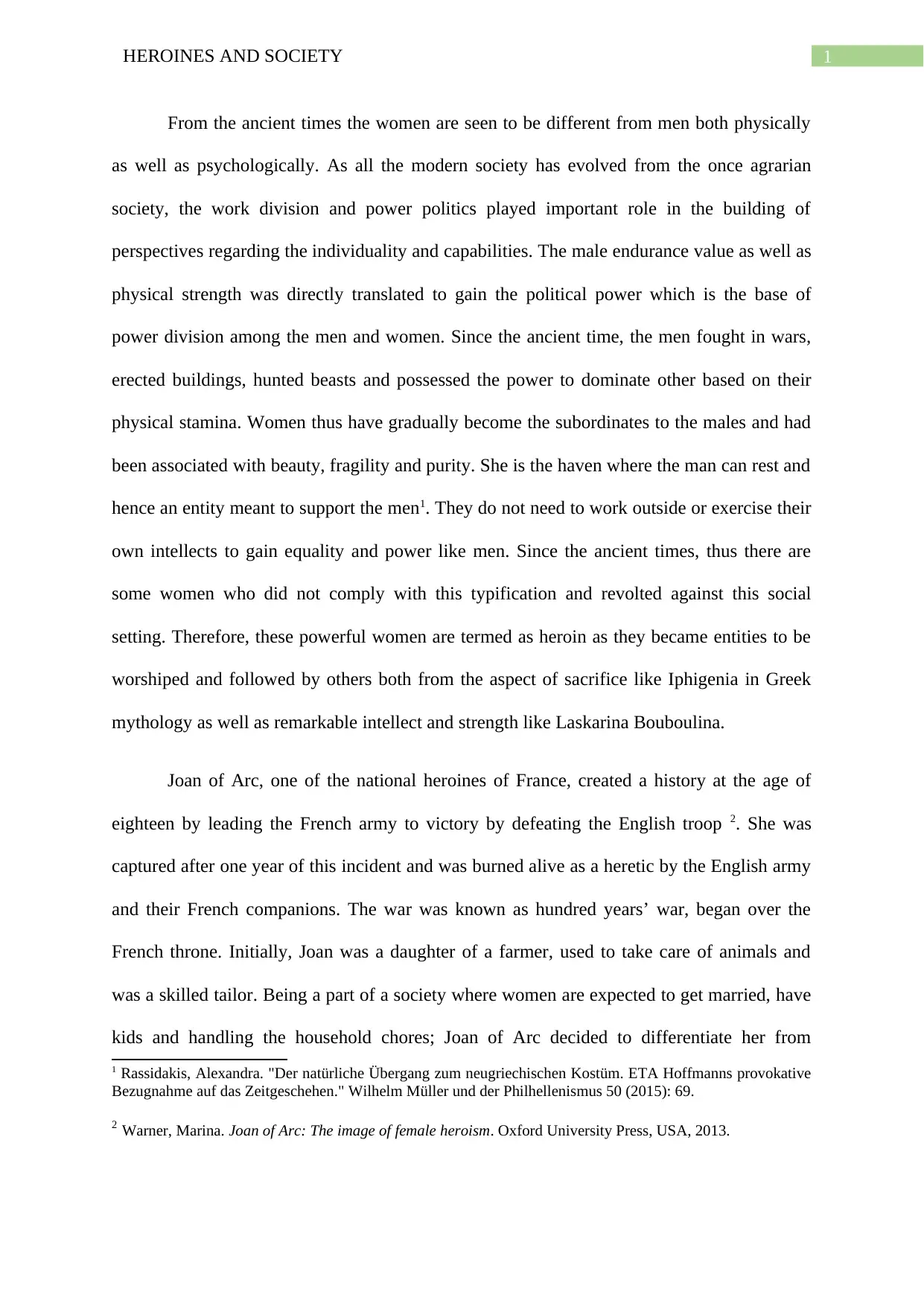
1HEROINES AND SOCIETY
From the ancient times the women are seen to be different from men both physically
as well as psychologically. As all the modern society has evolved from the once agrarian
society, the work division and power politics played important role in the building of
perspectives regarding the individuality and capabilities. The male endurance value as well as
physical strength was directly translated to gain the political power which is the base of
power division among the men and women. Since the ancient time, the men fought in wars,
erected buildings, hunted beasts and possessed the power to dominate other based on their
physical stamina. Women thus have gradually become the subordinates to the males and had
been associated with beauty, fragility and purity. She is the haven where the man can rest and
hence an entity meant to support the men1. They do not need to work outside or exercise their
own intellects to gain equality and power like men. Since the ancient times, thus there are
some women who did not comply with this typification and revolted against this social
setting. Therefore, these powerful women are termed as heroin as they became entities to be
worshiped and followed by others both from the aspect of sacrifice like Iphigenia in Greek
mythology as well as remarkable intellect and strength like Laskarina Bouboulina.
Joan of Arc, one of the national heroines of France, created a history at the age of
eighteen by leading the French army to victory by defeating the English troop 2. She was
captured after one year of this incident and was burned alive as a heretic by the English army
and their French companions. The war was known as hundred years’ war, began over the
French throne. Initially, Joan was a daughter of a farmer, used to take care of animals and
was a skilled tailor. Being a part of a society where women are expected to get married, have
kids and handling the household chores; Joan of Arc decided to differentiate her from
1 Rassidakis, Alexandra. "Der natürliche Übergang zum neugriechischen Kostüm. ETA Hoffmanns provokative
Bezugnahme auf das Zeitgeschehen." Wilhelm Müller und der Philhellenismus 50 (2015): 69.
2 Warner, Marina. Joan of Arc: The image of female heroism. Oxford University Press, USA, 2013.
From the ancient times the women are seen to be different from men both physically
as well as psychologically. As all the modern society has evolved from the once agrarian
society, the work division and power politics played important role in the building of
perspectives regarding the individuality and capabilities. The male endurance value as well as
physical strength was directly translated to gain the political power which is the base of
power division among the men and women. Since the ancient time, the men fought in wars,
erected buildings, hunted beasts and possessed the power to dominate other based on their
physical stamina. Women thus have gradually become the subordinates to the males and had
been associated with beauty, fragility and purity. She is the haven where the man can rest and
hence an entity meant to support the men1. They do not need to work outside or exercise their
own intellects to gain equality and power like men. Since the ancient times, thus there are
some women who did not comply with this typification and revolted against this social
setting. Therefore, these powerful women are termed as heroin as they became entities to be
worshiped and followed by others both from the aspect of sacrifice like Iphigenia in Greek
mythology as well as remarkable intellect and strength like Laskarina Bouboulina.
Joan of Arc, one of the national heroines of France, created a history at the age of
eighteen by leading the French army to victory by defeating the English troop 2. She was
captured after one year of this incident and was burned alive as a heretic by the English army
and their French companions. The war was known as hundred years’ war, began over the
French throne. Initially, Joan was a daughter of a farmer, used to take care of animals and
was a skilled tailor. Being a part of a society where women are expected to get married, have
kids and handling the household chores; Joan of Arc decided to differentiate her from
1 Rassidakis, Alexandra. "Der natürliche Übergang zum neugriechischen Kostüm. ETA Hoffmanns provokative
Bezugnahme auf das Zeitgeschehen." Wilhelm Müller und der Philhellenismus 50 (2015): 69.
2 Warner, Marina. Joan of Arc: The image of female heroism. Oxford University Press, USA, 2013.
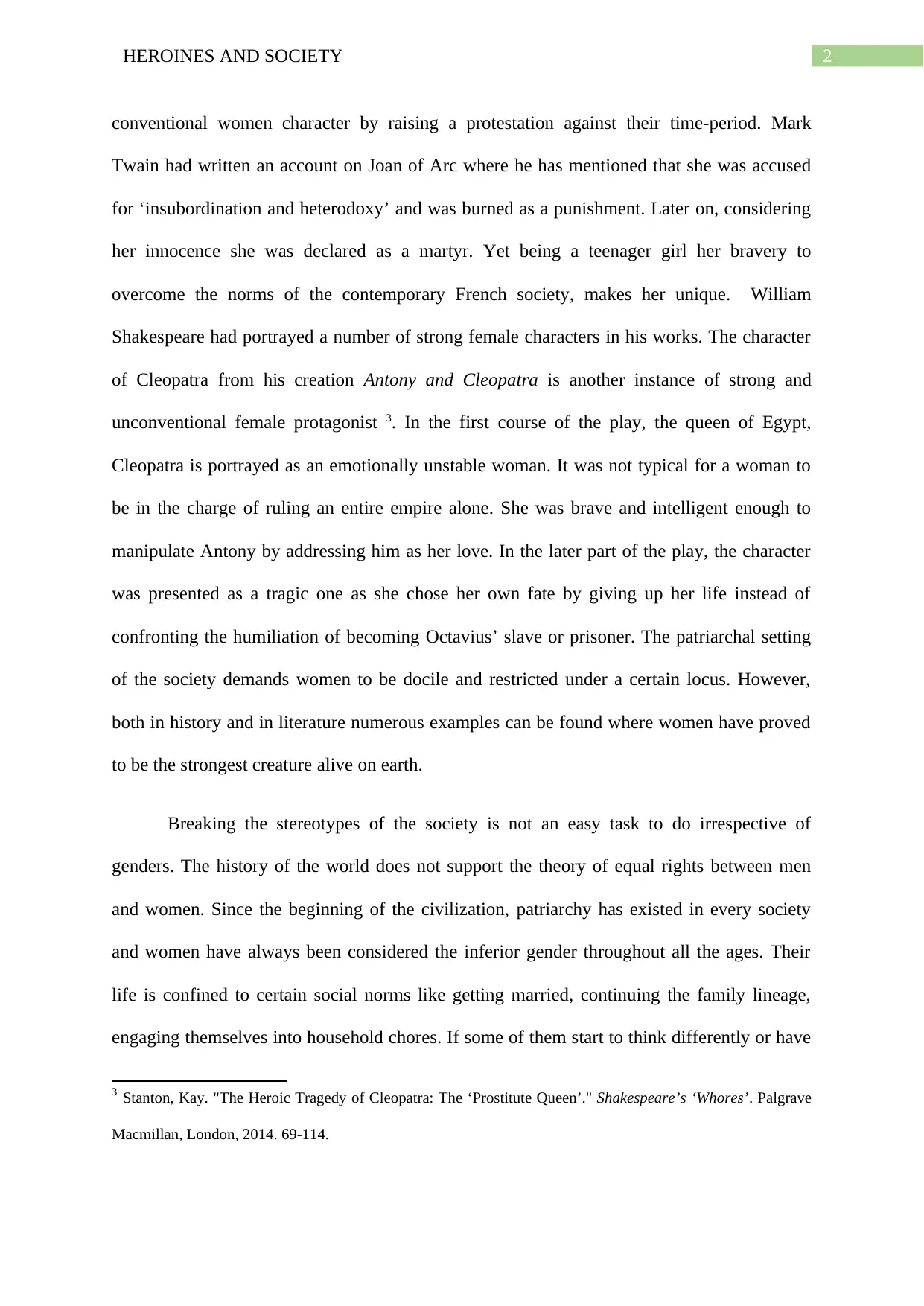
2HEROINES AND SOCIETY
conventional women character by raising a protestation against their time-period. Mark
Twain had written an account on Joan of Arc where he has mentioned that she was accused
for ‘insubordination and heterodoxy’ and was burned as a punishment. Later on, considering
her innocence she was declared as a martyr. Yet being a teenager girl her bravery to
overcome the norms of the contemporary French society, makes her unique. William
Shakespeare had portrayed a number of strong female characters in his works. The character
of Cleopatra from his creation Antony and Cleopatra is another instance of strong and
unconventional female protagonist 3. In the first course of the play, the queen of Egypt,
Cleopatra is portrayed as an emotionally unstable woman. It was not typical for a woman to
be in the charge of ruling an entire empire alone. She was brave and intelligent enough to
manipulate Antony by addressing him as her love. In the later part of the play, the character
was presented as a tragic one as she chose her own fate by giving up her life instead of
confronting the humiliation of becoming Octavius’ slave or prisoner. The patriarchal setting
of the society demands women to be docile and restricted under a certain locus. However,
both in history and in literature numerous examples can be found where women have proved
to be the strongest creature alive on earth.
Breaking the stereotypes of the society is not an easy task to do irrespective of
genders. The history of the world does not support the theory of equal rights between men
and women. Since the beginning of the civilization, patriarchy has existed in every society
and women have always been considered the inferior gender throughout all the ages. Their
life is confined to certain social norms like getting married, continuing the family lineage,
engaging themselves into household chores. If some of them start to think differently or have
3 Stanton, Kay. "The Heroic Tragedy of Cleopatra: The ‘Prostitute Queen’." Shakespeare’s ‘Whores’. Palgrave
Macmillan, London, 2014. 69-114.
conventional women character by raising a protestation against their time-period. Mark
Twain had written an account on Joan of Arc where he has mentioned that she was accused
for ‘insubordination and heterodoxy’ and was burned as a punishment. Later on, considering
her innocence she was declared as a martyr. Yet being a teenager girl her bravery to
overcome the norms of the contemporary French society, makes her unique. William
Shakespeare had portrayed a number of strong female characters in his works. The character
of Cleopatra from his creation Antony and Cleopatra is another instance of strong and
unconventional female protagonist 3. In the first course of the play, the queen of Egypt,
Cleopatra is portrayed as an emotionally unstable woman. It was not typical for a woman to
be in the charge of ruling an entire empire alone. She was brave and intelligent enough to
manipulate Antony by addressing him as her love. In the later part of the play, the character
was presented as a tragic one as she chose her own fate by giving up her life instead of
confronting the humiliation of becoming Octavius’ slave or prisoner. The patriarchal setting
of the society demands women to be docile and restricted under a certain locus. However,
both in history and in literature numerous examples can be found where women have proved
to be the strongest creature alive on earth.
Breaking the stereotypes of the society is not an easy task to do irrespective of
genders. The history of the world does not support the theory of equal rights between men
and women. Since the beginning of the civilization, patriarchy has existed in every society
and women have always been considered the inferior gender throughout all the ages. Their
life is confined to certain social norms like getting married, continuing the family lineage,
engaging themselves into household chores. If some of them start to think differently or have
3 Stanton, Kay. "The Heroic Tragedy of Cleopatra: The ‘Prostitute Queen’." Shakespeare’s ‘Whores’. Palgrave
Macmillan, London, 2014. 69-114.
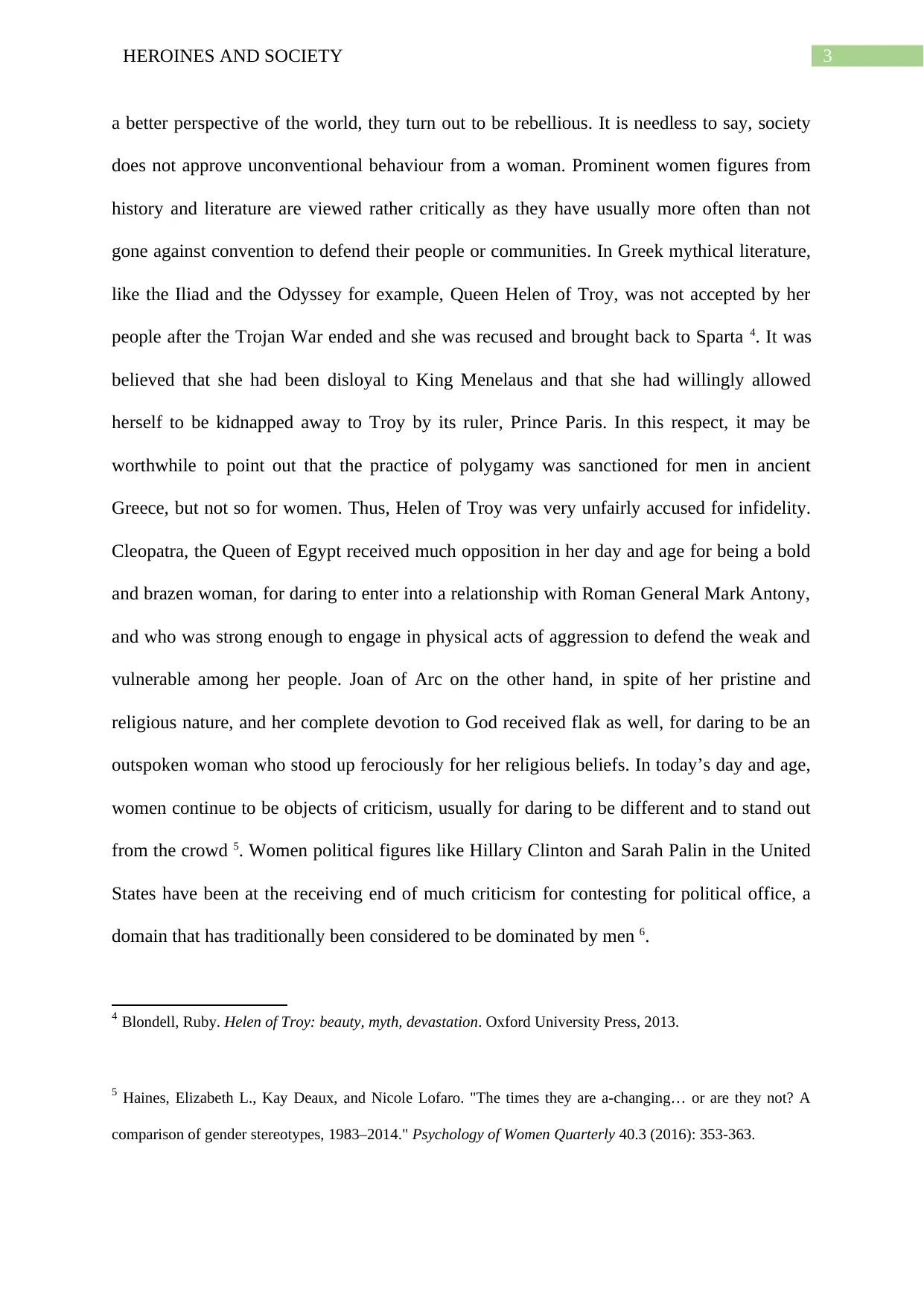
3HEROINES AND SOCIETY
a better perspective of the world, they turn out to be rebellious. It is needless to say, society
does not approve unconventional behaviour from a woman. Prominent women figures from
history and literature are viewed rather critically as they have usually more often than not
gone against convention to defend their people or communities. In Greek mythical literature,
like the Iliad and the Odyssey for example, Queen Helen of Troy, was not accepted by her
people after the Trojan War ended and she was recused and brought back to Sparta 4. It was
believed that she had been disloyal to King Menelaus and that she had willingly allowed
herself to be kidnapped away to Troy by its ruler, Prince Paris. In this respect, it may be
worthwhile to point out that the practice of polygamy was sanctioned for men in ancient
Greece, but not so for women. Thus, Helen of Troy was very unfairly accused for infidelity.
Cleopatra, the Queen of Egypt received much opposition in her day and age for being a bold
and brazen woman, for daring to enter into a relationship with Roman General Mark Antony,
and who was strong enough to engage in physical acts of aggression to defend the weak and
vulnerable among her people. Joan of Arc on the other hand, in spite of her pristine and
religious nature, and her complete devotion to God received flak as well, for daring to be an
outspoken woman who stood up ferociously for her religious beliefs. In today’s day and age,
women continue to be objects of criticism, usually for daring to be different and to stand out
from the crowd 5. Women political figures like Hillary Clinton and Sarah Palin in the United
States have been at the receiving end of much criticism for contesting for political office, a
domain that has traditionally been considered to be dominated by men 6.
4 Blondell, Ruby. Helen of Troy: beauty, myth, devastation. Oxford University Press, 2013.
5 Haines, Elizabeth L., Kay Deaux, and Nicole Lofaro. "The times they are a-changing… or are they not? A
comparison of gender stereotypes, 1983–2014." Psychology of Women Quarterly 40.3 (2016): 353-363.
a better perspective of the world, they turn out to be rebellious. It is needless to say, society
does not approve unconventional behaviour from a woman. Prominent women figures from
history and literature are viewed rather critically as they have usually more often than not
gone against convention to defend their people or communities. In Greek mythical literature,
like the Iliad and the Odyssey for example, Queen Helen of Troy, was not accepted by her
people after the Trojan War ended and she was recused and brought back to Sparta 4. It was
believed that she had been disloyal to King Menelaus and that she had willingly allowed
herself to be kidnapped away to Troy by its ruler, Prince Paris. In this respect, it may be
worthwhile to point out that the practice of polygamy was sanctioned for men in ancient
Greece, but not so for women. Thus, Helen of Troy was very unfairly accused for infidelity.
Cleopatra, the Queen of Egypt received much opposition in her day and age for being a bold
and brazen woman, for daring to enter into a relationship with Roman General Mark Antony,
and who was strong enough to engage in physical acts of aggression to defend the weak and
vulnerable among her people. Joan of Arc on the other hand, in spite of her pristine and
religious nature, and her complete devotion to God received flak as well, for daring to be an
outspoken woman who stood up ferociously for her religious beliefs. In today’s day and age,
women continue to be objects of criticism, usually for daring to be different and to stand out
from the crowd 5. Women political figures like Hillary Clinton and Sarah Palin in the United
States have been at the receiving end of much criticism for contesting for political office, a
domain that has traditionally been considered to be dominated by men 6.
4 Blondell, Ruby. Helen of Troy: beauty, myth, devastation. Oxford University Press, 2013.
5 Haines, Elizabeth L., Kay Deaux, and Nicole Lofaro. "The times they are a-changing… or are they not? A
comparison of gender stereotypes, 1983–2014." Psychology of Women Quarterly 40.3 (2016): 353-363.
Secure Best Marks with AI Grader
Need help grading? Try our AI Grader for instant feedback on your assignments.
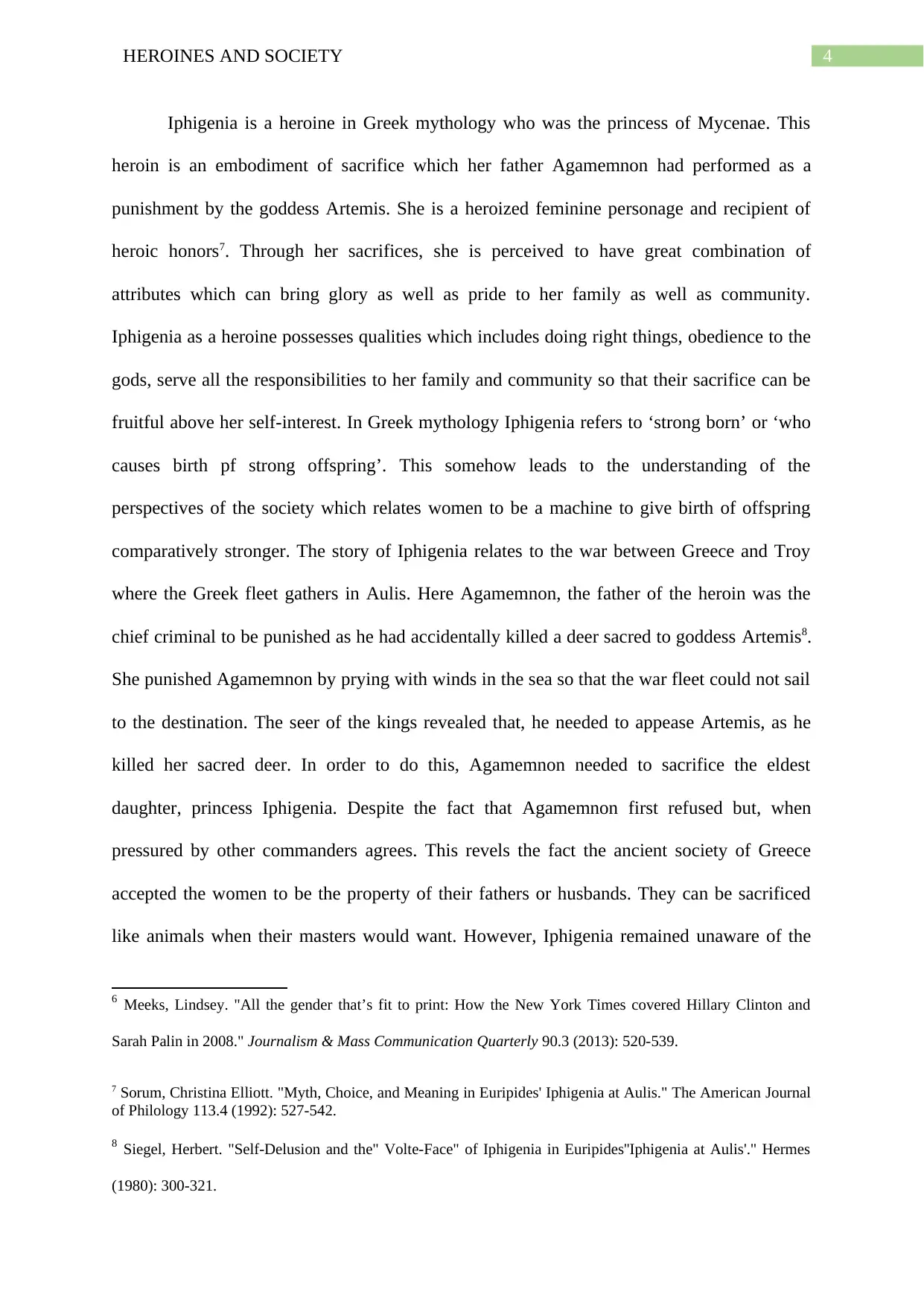
4HEROINES AND SOCIETY
Iphigenia is a heroine in Greek mythology who was the princess of Mycenae. This
heroin is an embodiment of sacrifice which her father Agamemnon had performed as a
punishment by the goddess Artemis. She is a heroized feminine personage and recipient of
heroic honors7. Through her sacrifices, she is perceived to have great combination of
attributes which can bring glory as well as pride to her family as well as community.
Iphigenia as a heroine possesses qualities which includes doing right things, obedience to the
gods, serve all the responsibilities to her family and community so that their sacrifice can be
fruitful above her self-interest. In Greek mythology Iphigenia refers to ‘strong born’ or ‘who
causes birth pf strong offspring’. This somehow leads to the understanding of the
perspectives of the society which relates women to be a machine to give birth of offspring
comparatively stronger. The story of Iphigenia relates to the war between Greece and Troy
where the Greek fleet gathers in Aulis. Here Agamemnon, the father of the heroin was the
chief criminal to be punished as he had accidentally killed a deer sacred to goddess Artemis8.
She punished Agamemnon by prying with winds in the sea so that the war fleet could not sail
to the destination. The seer of the kings revealed that, he needed to appease Artemis, as he
killed her sacred deer. In order to do this, Agamemnon needed to sacrifice the eldest
daughter, princess Iphigenia. Despite the fact that Agamemnon first refused but, when
pressured by other commanders agrees. This revels the fact the ancient society of Greece
accepted the women to be the property of their fathers or husbands. They can be sacrificed
like animals when their masters would want. However, Iphigenia remained unaware of the
6 Meeks, Lindsey. "All the gender that’s fit to print: How the New York Times covered Hillary Clinton and
Sarah Palin in 2008." Journalism & Mass Communication Quarterly 90.3 (2013): 520-539.
7 Sorum, Christina Elliott. "Myth, Choice, and Meaning in Euripides' Iphigenia at Aulis." The American Journal
of Philology 113.4 (1992): 527-542.
8 Siegel, Herbert. "Self-Delusion and the" Volte-Face" of Iphigenia in Euripides''Iphigenia at Aulis'." Hermes
(1980): 300-321.
Iphigenia is a heroine in Greek mythology who was the princess of Mycenae. This
heroin is an embodiment of sacrifice which her father Agamemnon had performed as a
punishment by the goddess Artemis. She is a heroized feminine personage and recipient of
heroic honors7. Through her sacrifices, she is perceived to have great combination of
attributes which can bring glory as well as pride to her family as well as community.
Iphigenia as a heroine possesses qualities which includes doing right things, obedience to the
gods, serve all the responsibilities to her family and community so that their sacrifice can be
fruitful above her self-interest. In Greek mythology Iphigenia refers to ‘strong born’ or ‘who
causes birth pf strong offspring’. This somehow leads to the understanding of the
perspectives of the society which relates women to be a machine to give birth of offspring
comparatively stronger. The story of Iphigenia relates to the war between Greece and Troy
where the Greek fleet gathers in Aulis. Here Agamemnon, the father of the heroin was the
chief criminal to be punished as he had accidentally killed a deer sacred to goddess Artemis8.
She punished Agamemnon by prying with winds in the sea so that the war fleet could not sail
to the destination. The seer of the kings revealed that, he needed to appease Artemis, as he
killed her sacred deer. In order to do this, Agamemnon needed to sacrifice the eldest
daughter, princess Iphigenia. Despite the fact that Agamemnon first refused but, when
pressured by other commanders agrees. This revels the fact the ancient society of Greece
accepted the women to be the property of their fathers or husbands. They can be sacrificed
like animals when their masters would want. However, Iphigenia remained unaware of the
6 Meeks, Lindsey. "All the gender that’s fit to print: How the New York Times covered Hillary Clinton and
Sarah Palin in 2008." Journalism & Mass Communication Quarterly 90.3 (2013): 520-539.
7 Sorum, Christina Elliott. "Myth, Choice, and Meaning in Euripides' Iphigenia at Aulis." The American Journal
of Philology 113.4 (1992): 527-542.
8 Siegel, Herbert. "Self-Delusion and the" Volte-Face" of Iphigenia in Euripides''Iphigenia at Aulis'." Hermes
(1980): 300-321.
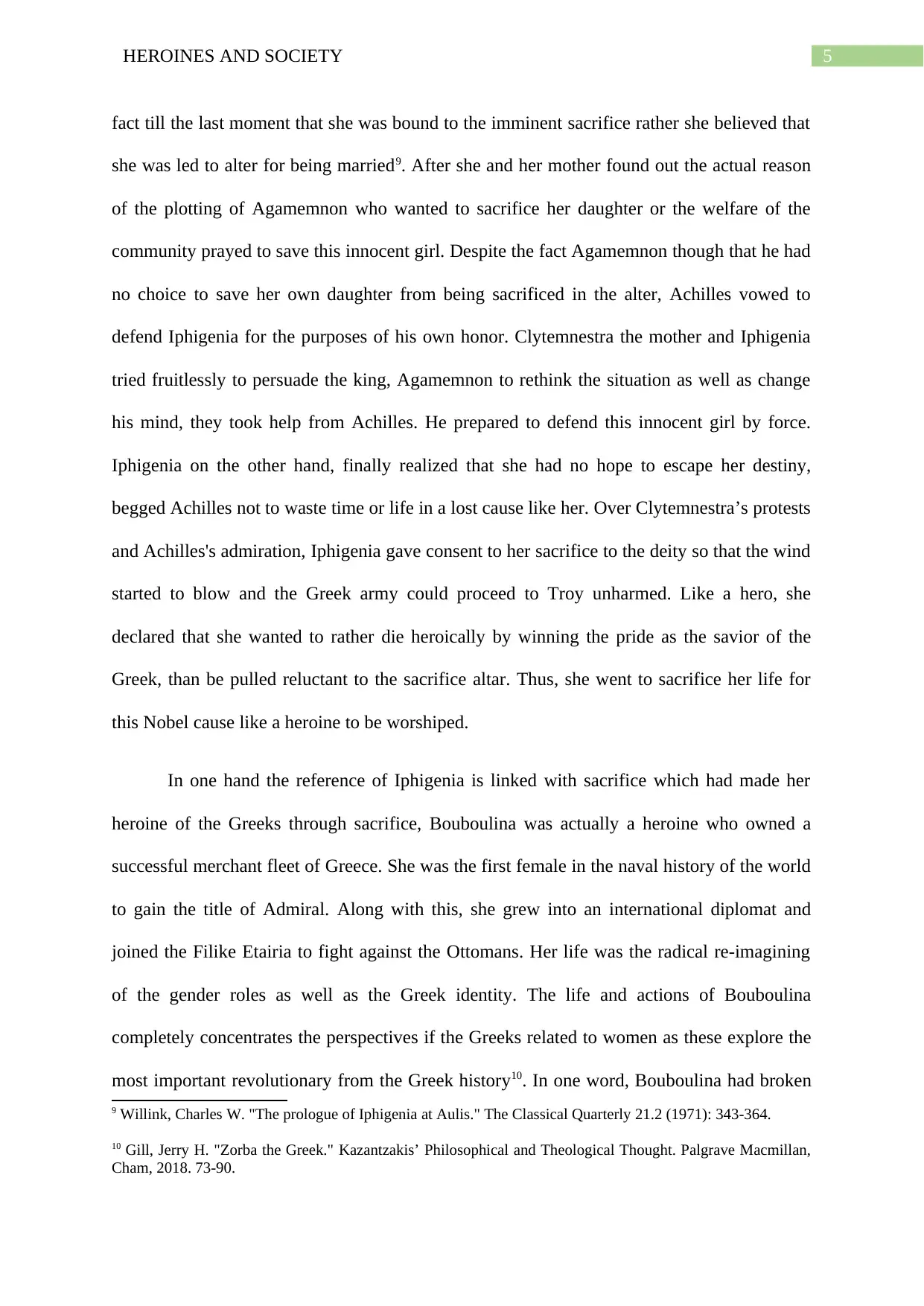
5HEROINES AND SOCIETY
fact till the last moment that she was bound to the imminent sacrifice rather she believed that
she was led to alter for being married9. After she and her mother found out the actual reason
of the plotting of Agamemnon who wanted to sacrifice her daughter or the welfare of the
community prayed to save this innocent girl. Despite the fact Agamemnon though that he had
no choice to save her own daughter from being sacrificed in the alter, Achilles vowed to
defend Iphigenia for the purposes of his own honor. Clytemnestra the mother and Iphigenia
tried fruitlessly to persuade the king, Agamemnon to rethink the situation as well as change
his mind, they took help from Achilles. He prepared to defend this innocent girl by force.
Iphigenia on the other hand, finally realized that she had no hope to escape her destiny,
begged Achilles not to waste time or life in a lost cause like her. Over Clytemnestra’s protests
and Achilles's admiration, Iphigenia gave consent to her sacrifice to the deity so that the wind
started to blow and the Greek army could proceed to Troy unharmed. Like a hero, she
declared that she wanted to rather die heroically by winning the pride as the savior of the
Greek, than be pulled reluctant to the sacrifice altar. Thus, she went to sacrifice her life for
this Nobel cause like a heroine to be worshiped.
In one hand the reference of Iphigenia is linked with sacrifice which had made her
heroine of the Greeks through sacrifice, Bouboulina was actually a heroine who owned a
successful merchant fleet of Greece. She was the first female in the naval history of the world
to gain the title of Admiral. Along with this, she grew into an international diplomat and
joined the Filike Etairia to fight against the Ottomans. Her life was the radical re-imagining
of the gender roles as well as the Greek identity. The life and actions of Bouboulina
completely concentrates the perspectives if the Greeks related to women as these explore the
most important revolutionary from the Greek history10. In one word, Bouboulina had broken
9 Willink, Charles W. "The prologue of Iphigenia at Aulis." The Classical Quarterly 21.2 (1971): 343-364.
10 Gill, Jerry H. "Zorba the Greek." Kazantzakis’ Philosophical and Theological Thought. Palgrave Macmillan,
Cham, 2018. 73-90.
fact till the last moment that she was bound to the imminent sacrifice rather she believed that
she was led to alter for being married9. After she and her mother found out the actual reason
of the plotting of Agamemnon who wanted to sacrifice her daughter or the welfare of the
community prayed to save this innocent girl. Despite the fact Agamemnon though that he had
no choice to save her own daughter from being sacrificed in the alter, Achilles vowed to
defend Iphigenia for the purposes of his own honor. Clytemnestra the mother and Iphigenia
tried fruitlessly to persuade the king, Agamemnon to rethink the situation as well as change
his mind, they took help from Achilles. He prepared to defend this innocent girl by force.
Iphigenia on the other hand, finally realized that she had no hope to escape her destiny,
begged Achilles not to waste time or life in a lost cause like her. Over Clytemnestra’s protests
and Achilles's admiration, Iphigenia gave consent to her sacrifice to the deity so that the wind
started to blow and the Greek army could proceed to Troy unharmed. Like a hero, she
declared that she wanted to rather die heroically by winning the pride as the savior of the
Greek, than be pulled reluctant to the sacrifice altar. Thus, she went to sacrifice her life for
this Nobel cause like a heroine to be worshiped.
In one hand the reference of Iphigenia is linked with sacrifice which had made her
heroine of the Greeks through sacrifice, Bouboulina was actually a heroine who owned a
successful merchant fleet of Greece. She was the first female in the naval history of the world
to gain the title of Admiral. Along with this, she grew into an international diplomat and
joined the Filike Etairia to fight against the Ottomans. Her life was the radical re-imagining
of the gender roles as well as the Greek identity. The life and actions of Bouboulina
completely concentrates the perspectives if the Greeks related to women as these explore the
most important revolutionary from the Greek history10. In one word, Bouboulina had broken
9 Willink, Charles W. "The prologue of Iphigenia at Aulis." The Classical Quarterly 21.2 (1971): 343-364.
10 Gill, Jerry H. "Zorba the Greek." Kazantzakis’ Philosophical and Theological Thought. Palgrave Macmillan,
Cham, 2018. 73-90.
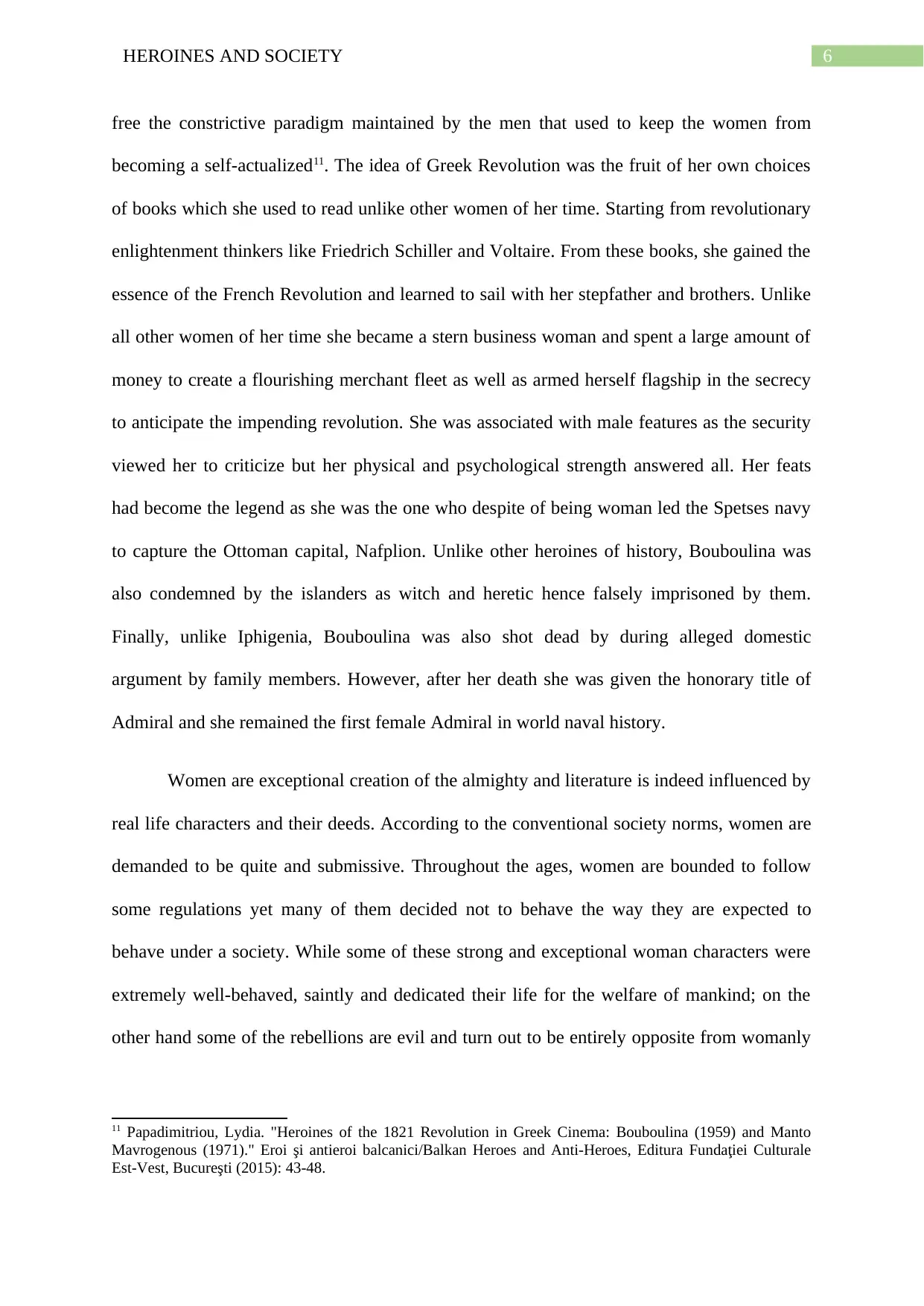
6HEROINES AND SOCIETY
free the constrictive paradigm maintained by the men that used to keep the women from
becoming a self-actualized11. The idea of Greek Revolution was the fruit of her own choices
of books which she used to read unlike other women of her time. Starting from revolutionary
enlightenment thinkers like Friedrich Schiller and Voltaire. From these books, she gained the
essence of the French Revolution and learned to sail with her stepfather and brothers. Unlike
all other women of her time she became a stern business woman and spent a large amount of
money to create a flourishing merchant fleet as well as armed herself flagship in the secrecy
to anticipate the impending revolution. She was associated with male features as the security
viewed her to criticize but her physical and psychological strength answered all. Her feats
had become the legend as she was the one who despite of being woman led the Spetses navy
to capture the Ottoman capital, Nafplion. Unlike other heroines of history, Bouboulina was
also condemned by the islanders as witch and heretic hence falsely imprisoned by them.
Finally, unlike Iphigenia, Bouboulina was also shot dead by during alleged domestic
argument by family members. However, after her death she was given the honorary title of
Admiral and she remained the first female Admiral in world naval history.
Women are exceptional creation of the almighty and literature is indeed influenced by
real life characters and their deeds. According to the conventional society norms, women are
demanded to be quite and submissive. Throughout the ages, women are bounded to follow
some regulations yet many of them decided not to behave the way they are expected to
behave under a society. While some of these strong and exceptional woman characters were
extremely well-behaved, saintly and dedicated their life for the welfare of mankind; on the
other hand some of the rebellions are evil and turn out to be entirely opposite from womanly
11 Papadimitriou, Lydia. "Heroines of the 1821 Revolution in Greek Cinema: Bouboulina (1959) and Manto
Mavrogenous (1971)." Eroi şi antieroi balcanici/Balkan Heroes and Anti-Heroes, Editura Fundaţiei Culturale
Est-Vest, Bucureşti (2015): 43-48.
free the constrictive paradigm maintained by the men that used to keep the women from
becoming a self-actualized11. The idea of Greek Revolution was the fruit of her own choices
of books which she used to read unlike other women of her time. Starting from revolutionary
enlightenment thinkers like Friedrich Schiller and Voltaire. From these books, she gained the
essence of the French Revolution and learned to sail with her stepfather and brothers. Unlike
all other women of her time she became a stern business woman and spent a large amount of
money to create a flourishing merchant fleet as well as armed herself flagship in the secrecy
to anticipate the impending revolution. She was associated with male features as the security
viewed her to criticize but her physical and psychological strength answered all. Her feats
had become the legend as she was the one who despite of being woman led the Spetses navy
to capture the Ottoman capital, Nafplion. Unlike other heroines of history, Bouboulina was
also condemned by the islanders as witch and heretic hence falsely imprisoned by them.
Finally, unlike Iphigenia, Bouboulina was also shot dead by during alleged domestic
argument by family members. However, after her death she was given the honorary title of
Admiral and she remained the first female Admiral in world naval history.
Women are exceptional creation of the almighty and literature is indeed influenced by
real life characters and their deeds. According to the conventional society norms, women are
demanded to be quite and submissive. Throughout the ages, women are bounded to follow
some regulations yet many of them decided not to behave the way they are expected to
behave under a society. While some of these strong and exceptional woman characters were
extremely well-behaved, saintly and dedicated their life for the welfare of mankind; on the
other hand some of the rebellions are evil and turn out to be entirely opposite from womanly
11 Papadimitriou, Lydia. "Heroines of the 1821 Revolution in Greek Cinema: Bouboulina (1959) and Manto
Mavrogenous (1971)." Eroi şi antieroi balcanici/Balkan Heroes and Anti-Heroes, Editura Fundaţiei Culturale
Est-Vest, Bucureşti (2015): 43-48.
Paraphrase This Document
Need a fresh take? Get an instant paraphrase of this document with our AI Paraphraser
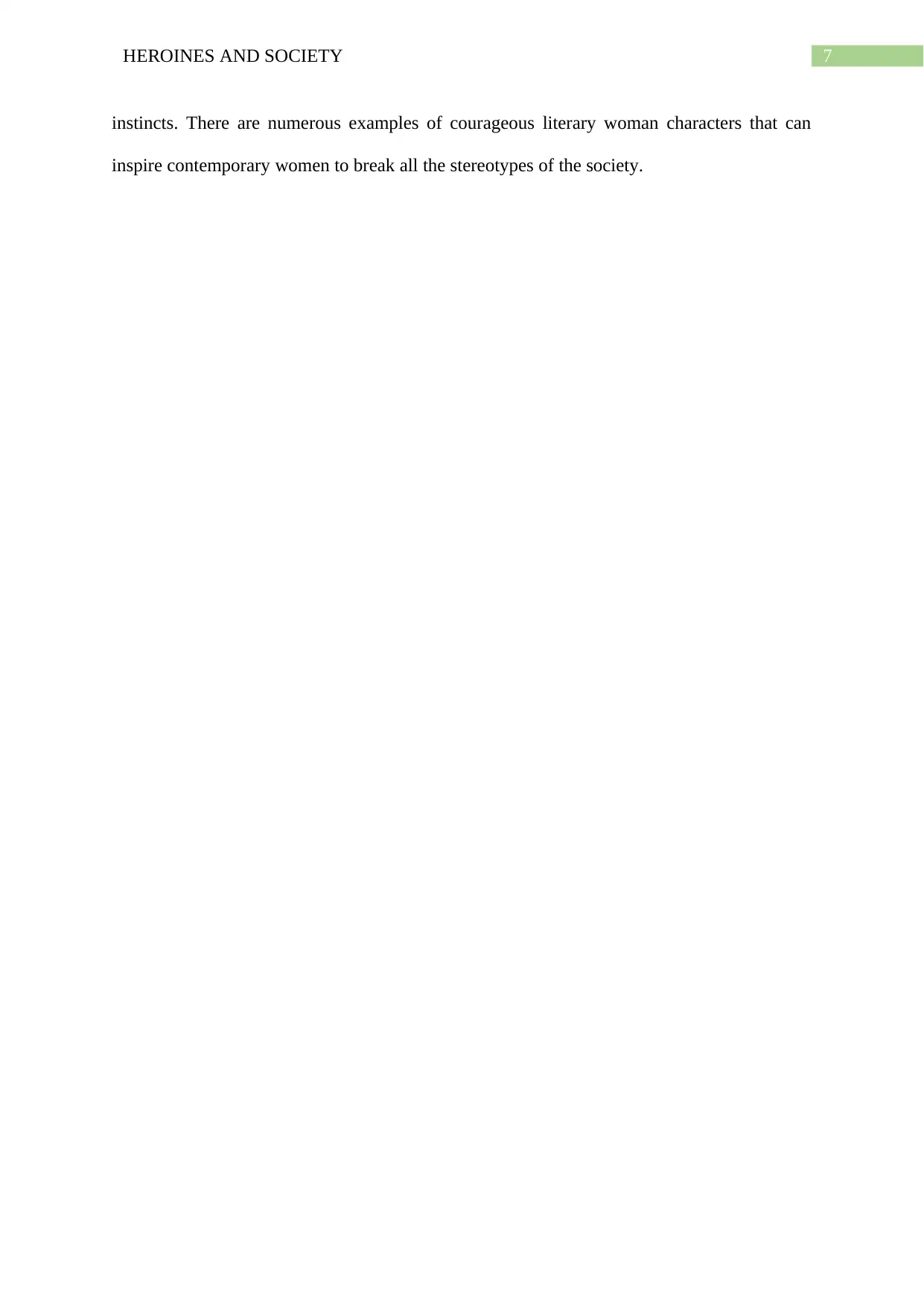
7HEROINES AND SOCIETY
instincts. There are numerous examples of courageous literary woman characters that can
inspire contemporary women to break all the stereotypes of the society.
instincts. There are numerous examples of courageous literary woman characters that can
inspire contemporary women to break all the stereotypes of the society.
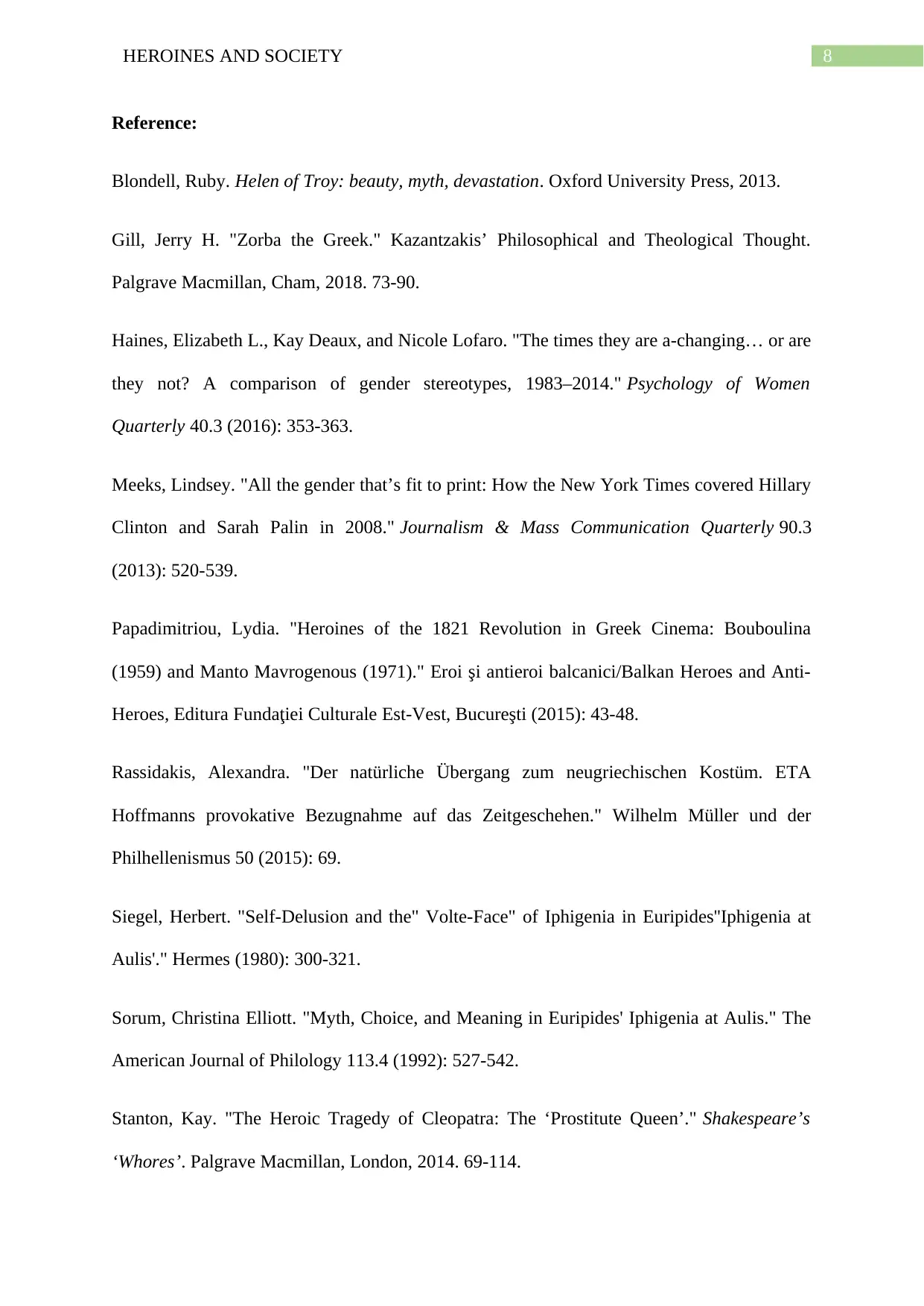
8HEROINES AND SOCIETY
Reference:
Blondell, Ruby. Helen of Troy: beauty, myth, devastation. Oxford University Press, 2013.
Gill, Jerry H. "Zorba the Greek." Kazantzakis’ Philosophical and Theological Thought.
Palgrave Macmillan, Cham, 2018. 73-90.
Haines, Elizabeth L., Kay Deaux, and Nicole Lofaro. "The times they are a-changing… or are
they not? A comparison of gender stereotypes, 1983–2014." Psychology of Women
Quarterly 40.3 (2016): 353-363.
Meeks, Lindsey. "All the gender that’s fit to print: How the New York Times covered Hillary
Clinton and Sarah Palin in 2008." Journalism & Mass Communication Quarterly 90.3
(2013): 520-539.
Papadimitriou, Lydia. "Heroines of the 1821 Revolution in Greek Cinema: Bouboulina
(1959) and Manto Mavrogenous (1971)." Eroi şi antieroi balcanici/Balkan Heroes and Anti-
Heroes, Editura Fundaţiei Culturale Est-Vest, Bucureşti (2015): 43-48.
Rassidakis, Alexandra. "Der natürliche Übergang zum neugriechischen Kostüm. ETA
Hoffmanns provokative Bezugnahme auf das Zeitgeschehen." Wilhelm Müller und der
Philhellenismus 50 (2015): 69.
Siegel, Herbert. "Self-Delusion and the" Volte-Face" of Iphigenia in Euripides''Iphigenia at
Aulis'." Hermes (1980): 300-321.
Sorum, Christina Elliott. "Myth, Choice, and Meaning in Euripides' Iphigenia at Aulis." The
American Journal of Philology 113.4 (1992): 527-542.
Stanton, Kay. "The Heroic Tragedy of Cleopatra: The ‘Prostitute Queen’." Shakespeare’s
‘Whores’. Palgrave Macmillan, London, 2014. 69-114.
Reference:
Blondell, Ruby. Helen of Troy: beauty, myth, devastation. Oxford University Press, 2013.
Gill, Jerry H. "Zorba the Greek." Kazantzakis’ Philosophical and Theological Thought.
Palgrave Macmillan, Cham, 2018. 73-90.
Haines, Elizabeth L., Kay Deaux, and Nicole Lofaro. "The times they are a-changing… or are
they not? A comparison of gender stereotypes, 1983–2014." Psychology of Women
Quarterly 40.3 (2016): 353-363.
Meeks, Lindsey. "All the gender that’s fit to print: How the New York Times covered Hillary
Clinton and Sarah Palin in 2008." Journalism & Mass Communication Quarterly 90.3
(2013): 520-539.
Papadimitriou, Lydia. "Heroines of the 1821 Revolution in Greek Cinema: Bouboulina
(1959) and Manto Mavrogenous (1971)." Eroi şi antieroi balcanici/Balkan Heroes and Anti-
Heroes, Editura Fundaţiei Culturale Est-Vest, Bucureşti (2015): 43-48.
Rassidakis, Alexandra. "Der natürliche Übergang zum neugriechischen Kostüm. ETA
Hoffmanns provokative Bezugnahme auf das Zeitgeschehen." Wilhelm Müller und der
Philhellenismus 50 (2015): 69.
Siegel, Herbert. "Self-Delusion and the" Volte-Face" of Iphigenia in Euripides''Iphigenia at
Aulis'." Hermes (1980): 300-321.
Sorum, Christina Elliott. "Myth, Choice, and Meaning in Euripides' Iphigenia at Aulis." The
American Journal of Philology 113.4 (1992): 527-542.
Stanton, Kay. "The Heroic Tragedy of Cleopatra: The ‘Prostitute Queen’." Shakespeare’s
‘Whores’. Palgrave Macmillan, London, 2014. 69-114.
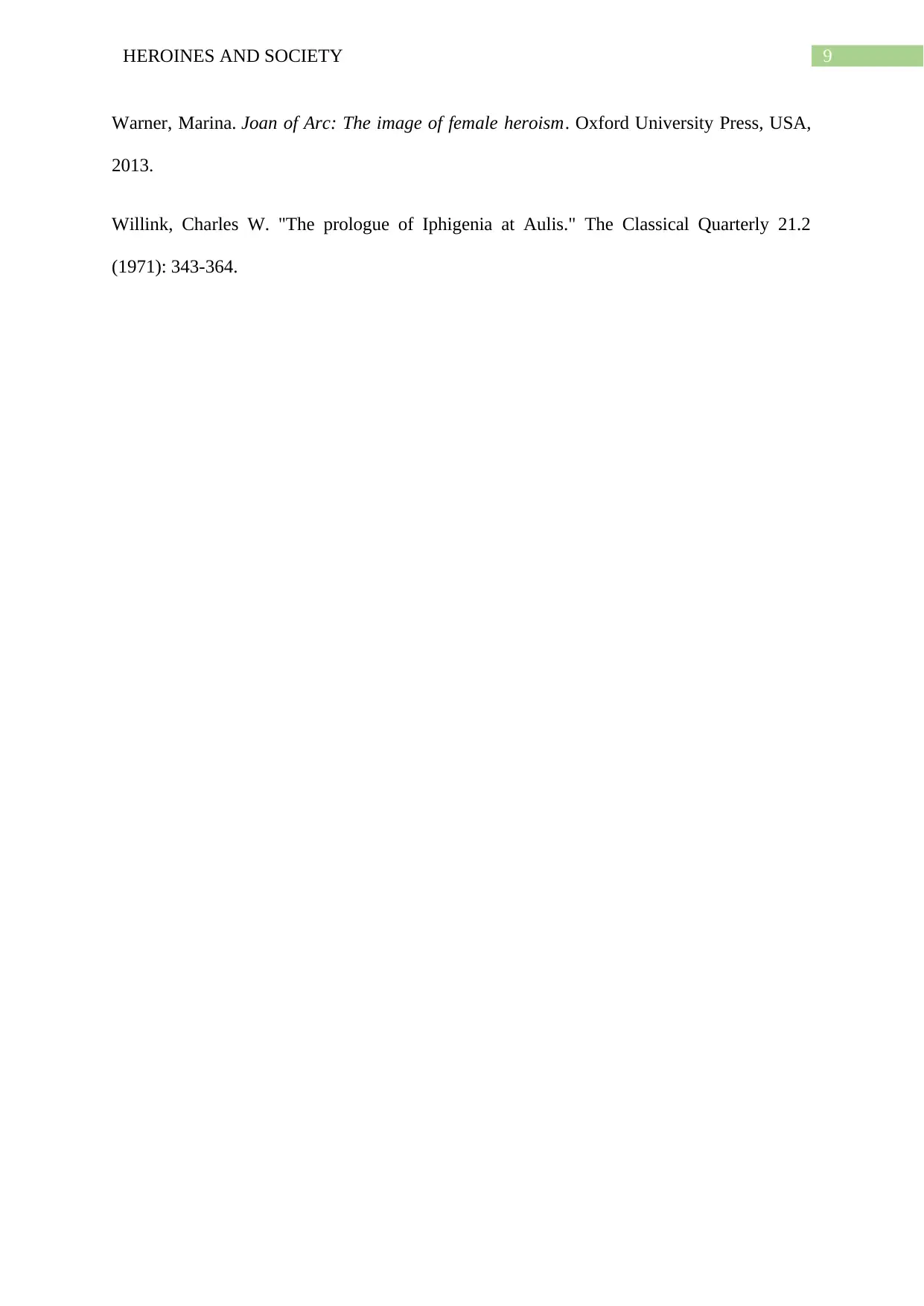
9HEROINES AND SOCIETY
Warner, Marina. Joan of Arc: The image of female heroism. Oxford University Press, USA,
2013.
Willink, Charles W. "The prologue of Iphigenia at Aulis." The Classical Quarterly 21.2
(1971): 343-364.
Warner, Marina. Joan of Arc: The image of female heroism. Oxford University Press, USA,
2013.
Willink, Charles W. "The prologue of Iphigenia at Aulis." The Classical Quarterly 21.2
(1971): 343-364.
1 out of 10
Related Documents
Your All-in-One AI-Powered Toolkit for Academic Success.
+13062052269
info@desklib.com
Available 24*7 on WhatsApp / Email
![[object Object]](/_next/static/media/star-bottom.7253800d.svg)
Unlock your academic potential
© 2024 | Zucol Services PVT LTD | All rights reserved.




